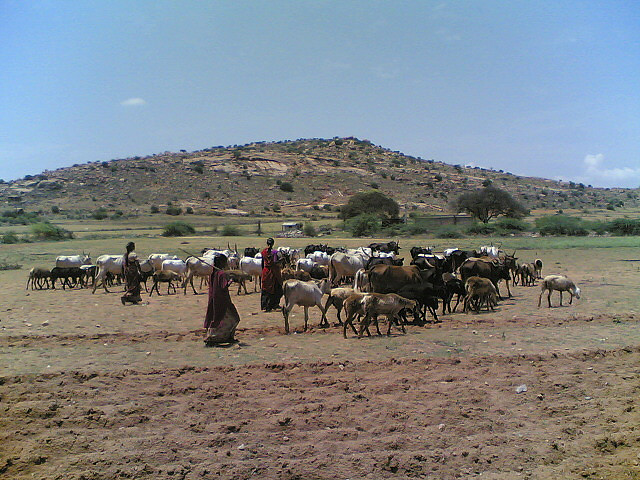Podcast: Play in new window | Download
Subscribe: RSS

The tragedy of the commons is that herdsmen will overgraze a common pasture unless constrained. The same, it seems, applies to water. (Photo by Srinivasa Krishna/Flickr)
If you liked what investment bankers and hedge-fund managers did to our economy in recent years, you’re going to love what water banks are doing to our ecosystem. The same, time-tested methods are in play: unleash unrestrained greed on a commodity that everyone needs in order to make obscene profits from it while destroying it. This new chapter in the Tragedy of the Commons sounds perfectly reasonable, with respectable water banks working to smooth out the vagaries of nature. But let’s try calling it by its proper name: hoarding.
The tragedy of the commons is an observation of human nature with a long pedigree. Its core metaphor is the commons, a grazing area open to all who live around it. The tragedy is that each herdsman, left to his own devices, will put as many animals on the commons as he can afford or raise, increasing his own wealth until the commons is overgrazed and destroyed. This tragedy can be averted only if the herdsmen cooperate in some form and regulate themselves.
Water is a commons. The planet is mostly covered by water, and water runs though it, moving from highlands to low, shape-shifting from sea to cloud, storming, flooding, oozing and fogging in a vast hydrological cycle that makes life possible. Not so long ago, it was unthinkable that humans would presume to own, profit from and try to control such a wondrous thing, but then land ownership seemed equally bizarre to the native Americans of the 18th Century. “The white man wants to own the land,” a speaker at an Iroquois council marveled. “You cannot own the land, any more than you can own the air, or water.” Well, two out of three is pretty bad.
In America the laws establishing rights to water, riparian law as it’s called, differ radically from east to west. East of the Mississippi River, where water is generally plentiful, rights to water traditionally have been constrained by concerns for the commons itself, are regulated to maintain the health of the water body and the rights of those who live downstream, or later in time. Western law is, shall we say, simpler. If you own a patch of land big enough to bore a well on, you own any water you can suck out of it. If a river touches your land, you own all the water you can pump.
Which is why, in the West, the saying is that “whiskey’s for drinking, water’s for fighting over.”
The John Wayne school of water management is bad enough when the streams are flowing and the rain is reasonably regular. But when drought comes, and survival becomes an issue, the guns come out. And drought has become a practically permanent feature of life in the West.
And that is where the water bank comes in. A water bank is an enormous impoundment of water, created by those who “own” it, and held back for use, um, later. Apologists for water banks claim it’s to use when drought threatens, but in practice the bank’s deposits have often been going to the highest bidders, which seem to be either pomegranate growers or distant desert cities. (I am not making this stuff up: pomegranates, a very thirsty crop, are the trendy fruit du jour, and making sure that they are continuously present on all the supermarket shelves from Nome to Orlando takes a lot of water.)
As the New York Times reported last week, water banking — which carries a strong whiff of a hedge against coming shortages, with huge potential profits to be made from human misery — has been growing. Two California water banks alone claim about a third of the annual flow of the Colorado River (which for years has not managed to reach the sea) and sit astride an underground vault containing 2 million acre-feet of water.
The creation of such huge reserves, of course, involved removing water from the aquifers and rivers — the commons, if you will — so that it could be truly owned and available for sale at an advantageous time. As the Times reports, the vast withdrawals of water are lowering aquifers, drying up other peoples’ wells and streams, and altering in unintended and unpredictable ways the unmapped underground geology.
In some respects water banking is the perfect capsule of natural resource exploitation by industry. Says an official of one of the affected water districts in California: “I don’t think anyone fully appreciated the magnitude of the impact they would have.” Says a water banker: “We haven’t seen enough data to indicate that our operations are the cause of the decline.”
And thus the decline continues, fast becoming a tragedy as the commons disappears.
-0-
[For updates on this and other Daily Impact stories, and for short takes on other subjects, check out The Editor’s Log.]